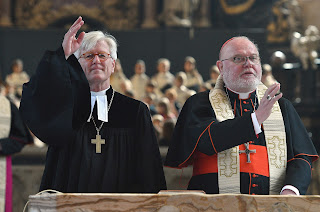Cardinals and Bishops in dispute about ecumenism
According to the Cardinal, there is an ethical fundamental difference between Catholics and Protestants. Cardinal Woelki has torpedoed the ecumenical course of Munich's Reinhard Marx.
The biggest surprise of the 2017 Reformation Jubilee is how well the Catholics and Protestants get along with each other 500 years after the division of the church. They celebrate a joint Festival of Christ, leading representatives of both denominations have gone on pilgrimage to the Holy Land, have regretted and condemned the mutual condemnations of the past, and now they are so united.
The Cardinal Reinhard Marx and Heinrich Bedford-Strohm (the Council President of the Protestant Church in Germany), wanted this to be even more:
At the end of the year, Protestant Christians from mixed denominational couples on a case by case basis were to be admitted to the Catholic communion, a small step that something is moving in ecumenism. It was clear that Rome was ready to "make progress this year", said Cardinal Walter Kasper, once the "Ecumenical Minister" of the Curia and now one of the favourite theologians of Pope Francis.
Ecumenical table and bed yes, Eucharist no
Catholic-Protestant couples are not allowed to participate in the Lord's Supper. Well, in the Reformation year, there are signals from the Vatican of change coming soon.
But that is not going to happen as there is a discordant note in the harmony of the Reformation year. In this case, it is not coming from the hard-fisted interferers in Rome, but with the fact that the Catholic bishops in Germany cannot agree. They meet from Monday evening for the autumn meeting in Fulda - and on Tuesday, when if the 68 bishops and auxiliary bishops accept their work, a sweeping blow against ecumenism and the admission of Protestants to the Eucharist will appear in the ecclesiastical journal, Herder Correspondenz. The text has been given to the Süddeutsche Zeitung. It author: the Cologne Cardinal Rainer Maria Woelki, Archbishop of the largest German bishopric - and increasingly the polar opposite to the bishop's chairman, Marx.
With all the joy of mutual appreciation, one should not hide the problems in ecumenism, writes Woelki. So there is an "increasing disagreement on moral and social ethics," in bioethics, on "marriage for all", in the "assessment of abortion, euthanasia or divorce", so much so that one must “talk of an ethical fundamental difference between both confessions”.
Woelki causes disruption by stating that the Protestant church presents itself as a "confession of freedom" - against the Catholic Church, which then appears to be unfree and backward, and confronts the Protestants. Luther had preached the absolute obedience to God, "not the freedom of autonomous self-determination." He, Woelki, doubted "in the face of the many divisions of Protestantism" that " a confessional unit can be based on Luther's sola scriptura (alone from Scripture) " -the Pope and Magisterium is necessary for this unity.
Visiting Boniface
From 16 to 21 October 1867, German Catholic bishops met for a "confidential discussion about the most important questions of the time" - in Fulda at the tomb of St. Boniface, the "Apostle of the Germans". The place and the assembly were signs. The bishops wanted to demonstrate self-consciousness against the Prussian-Protestant supremacy. The first meeting has become a tradition: For the past 150 years, Germany's bishops have been meeting for the autumn assembly in Fulda.
And why should not the Protestants agree with Catholics on the definition of the priesthood, the bishop's office? At present a mutual invitation to the Eucharist and the Lord's Supper is dishonest. According to the Cardinal, Martin Luther would not "invite the Catholics to the communion of the Lord's Supper" unless there was a common confession.
The contribution is thus gaining in importance because here not an individual ecumenically-frustrated person writes about his wrath from the soul (within the Archbishopric of Cologne, it is said that Woelki limits his ecumenical commitment to the necessary). The Cardinal in Cologne summarizes what those bishops think, that the harmony to the Reformation year goes too far, but they do not dare to formulate this too sharply: you cannot water down the positive headlines because of your own faith. Seven of the 27 diocesan bishops are against the invitation of selected Protestants to Communion, it is said. Now that Woelki has so openly made himself the spokesman for this minority, it should be over with the ecumenical sign: the statute.











.jpeg)

Comments